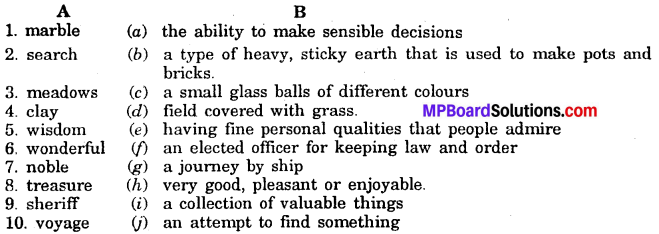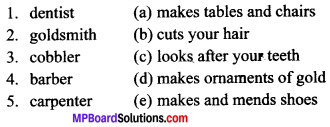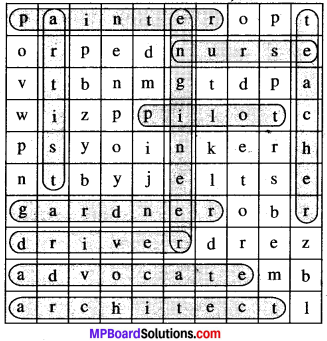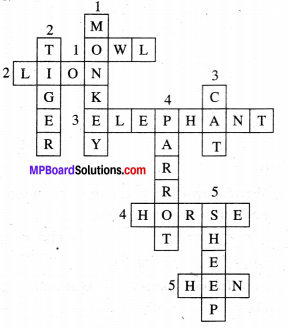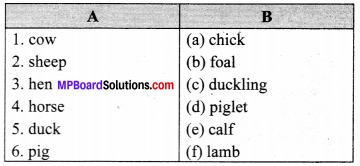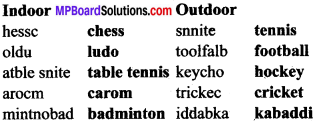Students who wish to prepare the English Subject can rely on the MP Board Solutions for Class 6 English Translation Questions and Answers prevailing. Become perfect with the concepts of Class 6 English Translation Questions and Answers, Grammar, Summary, Notes, Guide, Pdf, by preparing you can score highest grade in your exams. Here, You Can Download MP Board Class 6 English Solutions. Detailed Solutions are provided to the concepts by experts keeping in mind the latest edition textbooks and syllabus.
MP Board Class 6th Special English Translation
Ace up your preparation by referring to the Madhya Pradesh State Board Solutions for Class 6 Translation Questions and Answers and learn all the topics within. Click on the topic you want to prepare from the Class 6 English and prepare it easily. You can understand your strengths and weaknesses by learining the Questions and Answers in MP Board Solutions for Class 6 English PDF.
Use of ‘Is, Are, Am’
हिन्दी वाक्यों की पहचान – वाक्य के अन्त में ‘है, हैं और हूं’ शब्द होते हैं। ये Present Tense (वर्तमान काल) के वाक्य होते हैं।
अनुवाद के नियम –
- हिन्दी वाक्य की अंग्रेजी बनाते समय पहले Subject (का) रखा जाता है। फिर Verb (क्रिया) का प्रयोग होता है।
- ‘है’ की अंग्रेजी is’ है जिसका प्रयोग Singular Subjects जैसे He, She, It, This तथा That के साथ किया जाता है।
- हैं’ तथा ‘हो’ की अंग्रेजी ‘are’ है। इसका प्रयोग Plural Subject जैसे These, Those के साथ किया जाता है।
- ‘हूं’ की अंग्रेजी ‘am’ है। I के साथ सदैव ‘am’ का प्रयोग किया जाता है।
- Negative वाक्यों की रचना Is, Are, Am के पश्चात् ‘not’ रखकर की जाती है।
- Interrogative वाक्यों की रचना करने के लिए is, are या am को Subject से पहले रखा जाता है। वास्य के अन्त में Full – stop (.) के स्थान पर प्रश्नवाचक चिन्ह (?) प्रयोग किया जाता है।
Examples:
(A) Affirmative Sentences (सकारात्मक वाक्य)
- हरी एक लड़का है।
Hari is a boy. - तुम एक विद्यार्थी हो।
You are a student. - मैं तुम्हारा मित्र हूं।
I am your friend. - ये गायें हैं।
These are cows.
(B) Negative Sentences (निषेधात्मक वाक्य)
- वह अच्छा लड़का नहीं है।
He is not a good boy. - वे किसान नहीं हैं।
They are not farmers. - मैं भूखा नहीं हूं।
I am not hungry.
(C) Interrogative Sentences (प्रश्नवाचक वाक्य)
- क्या यह एक पुस्तक है?
Is this a book? - क्या वे प्यासे हैं?
Are they thirsty? - क्या मैं बुरा हूं?
Am I bad?
EXERCISE 1
Translate into English :
- सीता एक नर्स है।
- हम अच्छे लड़के हैं।
- मैं प्यासा हूं।
- यह स्लेट अच्छी नहीं है।
- मैं एक खिलाड़ी नहीं हूं।
- लड़के कक्षा में नहीं हैं।
- क्या तुम थके हो?
Vocabulary :
नर्स – nurse; प्यासा – thirsty; स्लेट – slate; खिलाड़ी – player; थका – tired.
Use of Was,’ and ‘Were’.
हिन्दी वाक्यों की पहचान – वाक्यों के अन्त में ‘था, थे, थी, थीं, शब्द होते हैं। ये Past Tense (भूतकाल) के वाक्य होते हैं।
अनुवाद के नियम –
- ‘था’, ‘थी’, की अंग्रेजी was होती है। He, She, It, This, That, I तथा Singular Subjects (एकवचन कता) के साथ ‘was’ का प्रयोग किया जाता है।
- ‘थे’ ‘थीं’ की अंग्रेजी ‘were’ होती है। We, You They, Those तथा Plural Subjects (बहुवचन के कर्ता) के साथ ‘were’ का प्रयोग किया जाता है।
- Negative Sentences की रचना was या were के पश्चात् not रखकर की जाती है
- Interrogative Sentences की रचना was या were को Subject (कता) के पूर्व रखकर की जाती है और वाक्य के अन्त में प्रश्नवाचक चिन्ह (?) लगाया जाता है।
Examples:
(A) Affirmative Sentences (सकारात्मक वाक्य)
- वह एक सैनिक था।
He was a soldier - वे खिलाड़ी थे।
They were players. - उसकी गायें खेत में थीं।
His cows were in the field.
(B) Negative Sentences (निषेधात्मक वाक्य)
- तुम्हारा कलम काला नहीं था।
Your pen was not black. - वे कक्षा में नहीं थे।
They were not in the class. - तुम घर पर नहीं थे।
You were not at home.
(C) Interrogative Sentences (प्रश्नवाचक वाक्य)
- क्या बर्तन गर्म था?
Was the pot hot? - क्या बन्दर घर में थे?
Were the monkeys in the house? - क्या वह कल बीमार था?
Was he ill yesterday?
EXERCISE 2
Translate into English :
- वह एक लड़का था।
- तीन लड़कियां पार्क में थीं।
- तुम अपने पिता के साथ थे।
- गीता बदसूरत नहीं थीं।
- मैं कमरे में नहीं था।
- गन्ने मीठे नहीं थे।
Vocabulary :
पार्क – park; साथ – with; बदसूरत – ugly; गन्ना – sugarcane; मीठा – sweet.
Use of ‘Has, Have, Had’
हिन्दी वाक्यों की पहचान – जिन वाक्यों में इनका प्रयोग होता है, उनसे किसी के अधिकार में किसी वस्तु के होने का बोध होता है।
अनुवाद के नियम –
- ‘पास है’ अथवा ‘रखता है’ के लिए He, She, It और Singular Subjects (एकवचन कता) के साथ ‘Has’ का प्रयोग Present Tense में किया जाता है।
- I, You, We, They तथा Plural Subjects (बहुवचन कर्ता) के साथ ‘have’ का प्रयोग Prestent Tense में किया जाता है।
- ‘पास था’ या ‘रखता था’ या ‘रखते थे’ के लिए ‘had’ का प्रयोग Past Tense में किया जाता है।
- Negative वाक्य बनाने के लिए has, have या had के पश्चात् ‘no’ या ‘not’ का प्रयोग किया जाता है।
- Interrogative वाक्यों की रचना करते समय has, have, अथवा had को Subject के पूर्व रखा जाता है। वाक्य के अन्त में प्रश्नसूचक चिन्ह (?) का प्रयोग किया जाता है।
Examples:
(A) Affirmative Sentences (सकारात्मक वाक्य)
- कुत्ते के पास एक हड्डी है।
The dog has a bone. - मेरे पास एक अंगूठी है।
I have a ring. - लड़कों के पास कलम है।
The boys have pens. - तुम्हारे पास चाकू था।
You had a knife.
(B) Negative Sentences (निषेधात्मक वाक्य)
- सुरेश के पास पुस्तक नहीं है।
Suresh has no book. - तुम्हारे पास ताला नहीं है।
You have not a lock. - लड़के के पास प्याला नहीं था।
The boy had no cup.
(C) Interrogative Sentences (प्रश्नवाचक वाक्य)
- क्या तुम्हारे पास अंगूठी है?
Have you a ring? - क्या सीमा के पास दो रूपये हैं?
Has Seema two rupees? - क्या उसके पास उपन्यास था?
Had he a novel?
EXERCISE 3
Translate into English :
- डाकिये के पास एक थैला है।
- उसके पास दो मकान हैं।
- मेरे पास एक रोचक पुस्तक है।
- कौवे की एक चोंच होती है।
- मेरे पास गेंद नहीं हैं।
- तुम्हारे पास दस रूपये नहीं थे।
- साधू के पास भोजन न था।
- क्या माली के पास एक गाय है?
Vocabulary :
डाकिया – postman; रोचक – interesting; चोंच – beak; साधू – saint; धन – money; माली – gardener.
Imperative Sentences (Orders and Requests)
हिन्दी वाक्यों की पहचान – इन वाक्यों में आज्ञा दी जाती है, प्रार्थना की जाती है, कुछ मांगा जाता है या उपदेश दिया जाता है।
अनुवाद के नियम –
- ऐसे वाक्यों की अंग्रेजी बनाने के लिए Verb (क्रिया) की First form को वाक्य के आरम्भ में रखा जाता है।
- ऐसे वाक्यों का कर्ता You’ होता है, जो लुप्त रहता है।
- ऐसे वाक्यों में ‘अपने’ की अंग्रेजी सदैव Your प्रयोग की जाती है।
- यदि वाक्य में ‘मत’ शब्द आया हो, तो उसके लिए Do not पहले रखते हैं।
Examples:
(A) Affirmative Sentences (सकारात्मक वाक्य)
- यहां आओं।
Come here. - पत्र लिखों।
Write a letter. - अपनी पुस्तक पढ़ों।
Read your book. - कृपया मुझे पानी दीजिए।
Please give me water. - वहां मत जाओ।
Do not go there.
EXERCISE 4
Translate into English :
- वहां जाओं।
- बैंच पर खड़े हो जाओ।
- मुझे अपने दाँत दिखाओ।
- कृपया मेरी बात सुनो।
- धीरे – धीरे चलो।
- तेज मत भागो।
- अपने बड़ों का कहना मानो।
Vocabulary :
दांत – teeth; मेरी सुनो – listen to me; धीरे – धीरे – slowly; तेज – fast; कहना मानो – obey; सुबह सवेरे – early in the morning.
Present Indefinite Tense
Or
Simple Present Tense
इस काल के वाक्यों की पहचान – वाक्यों के अन्त में ‘ता है, ती हूं’ आदि शब्द आते हैं।
- Simple Sentences में He, She, It तथा एकवचन कर्ता के साथ Verb की First form के अन्त में ‘s’ या ‘es’ लगाया जाता है।
- I, You, We, They तथा बहुवचन कर्ता के साथ केवल Verb की First form प्रयोग की जाती है।
- Negative Sentences की रचना में He, She, It, तथा एकवचन कर्ता के साथ Verb की First form के पूर्व does not लगाया जाता है।
- I, You, We, They तथा बहुवचन कर्ता के साथ Verb की First form के पहले do not प्रयोग किया जाता है।
- ‘कभी नहीं’ के लिए क्रिया के पूर्व never लगाया जाता है। Never के साथ do या does का प्रयोग नहीं किया जाता है। परन्तु यदि कर्ता एकवचन है, तो क्रिया के अन्त में ‘s’ या ‘es’ का प्रयोग किया जाता है।
- Interrogative Sentences की रचना में Subject के पूर्व Do या Does प्रयोग करके कर्ता के पश्चात् Verb की First form का प्रयोग किया जाता है।
Examples:
(A) Affirmative Sentences (सकारात्मक वाक्य)
- राकेश खेलता है।
Rakesh plays. - सीमा वहां रोज जाती है।
Seema goes there daily. - मैं पत्र लिखता हूं।
I write a letter. - लड़के स्कूल जाते हैं।
The boys go to school.
(B) Negative Sentences (निषेधवाचक वाक्य)
- यह लड़का नहीं पढ़ता है।
This boy does not read. - मोर यहां नहीं रहते हैं।
The peacocks do not live here. - वह यहां कभी नहीं आता है।
He never comes here.
(C) Interrogative Sentences (प्रश्नवाचक वाक्य)
- क्या रवि पढ़ता है?
Does Ravi read? - क्या तुम वहां जाते हो?
Do you go there? - क्या लड़के शोर मचाते हैं?
Do the boys make a noise?
EXERCISE 5
Translate into English :
- वह रोज गांव जाता है।
- हम शाम को खेलते हैं।
- सूर्य पूर्व में निकलता है।
- मेरे पिताजी मेरी देखभाल करते हैं।
- किरन नहीं खेलती है।
- तुम मेरा कहना नहीं मानते हो?
- वे कभी झूठ नहीं बोलते हैं।
- क्या बच्चा रात में सोता है?
Vocabulary:
रोज – daily; निकलना – rise; देखभाल करना – look after; कहना मानना – obey; झूठ बोलना – tell me lie; रोना – weep; धोबी – washer – man; तालाब – tank.
Present Continuous Tense
हिन्दी वाक्यों की पहचान –
- कार्य लगातार चलता रहता है, परन्तु समय दिया हुआ नहीं होता है।
- वाक्यों में अन्त में ‘रहा है, रही है, रहा हूं, रहे हैं, रही हैं’ आदि होते हैं।
अनुवाद के नियम –
- इस Tense के वाक्यों का अनुवाद करने के लिए Verb की पहली form के अन्त में ‘ing’ जोड़ कर उसके पूर्व is, are या am रख दिया जाता है। You, We, They तथा बहुवचन के साथ ‘are’ लगाया जाता है।
- I के साथ am लगाया जाता है।
- He, She, It, तथा एकवचन कर्ता के साथ is’ का प्रयोग किया जाता है।
- Negative Sentences में is, are, am के बाद not लगाकर अनुवाद किया जाता है।
- Interrogative Sentences की रचना is, are या am को वाक्य के पूर्व रखकर की जाती है और वाक्य के अन्त पर प्रश्नसूचक चिन्ह (?) लगाया जाता हैं।
Examples:
(A) Affirmative Sentences (सकारात्मक वाक्य)
- भूषण बाजार जा रहा है।
Bhushan is going to bazaar. - मैं अपना काम कर रहा हूं।
I am doing my work. - लड़के हॉकी खेल रहे हैं।
The boys are playing hockey.
(B) Negative Sentences (निषेधवाचक वाक्य)
- लड़की नहीं नाच रही है।
The girl is not dancing. - तुम अपना काम नहीं कर रहे हो।
You are not doing your work. - मैं सो नहीं रहा हूं।
I am not sleeping.
(C) Interrogative Sentences (प्रश्नवाचक वाक्य)
- क्या सुनील सो रहा है?
Is Suneel sleeping? - क्या वे अपने गांव जा रहे हैं?
Are they going to their village? - क्या मैं उसकी सहायता नहीं कर रहा हूं?
Am I not helping here
EXERCISE 6
Translate into English :
- मैं कठिन परिश्रम कर रहा हूं।
- वह अपना कार्य कर रहा है।
- लड़कियां खाना बना रही हैं।
- रवि प्रश्न हल नहीं कर रहा है।
- मैं इस मकान में नहीं रह रहा हूं।
- लड़के मैच नहीं खेल रहे हैं।
- क्या कौवा पेड़ पर बैठा है?
- क्या लड़के नदी में नहा रहे हैं?
Vocabulary :
कठिन परिश्रम करना – to work hard; खाना बनाना – to prepare food; हल करना to solve; भेच – match; कौवा – crow; नदी – river; नहाना – to bathe.
Present Perfect Tense
इस काल के वाक्य की पहचान –
- इस काल के वाक्यों में काम समाप्त हो जाता है।
- वाक्यों के अन्त में ‘या है, ओं है, ई हूं, चुका हैं, चुके हैं, चुका हूं’ आदि होते हैं।
अनुवाद के नियम –
- Simple Sentence में जब कर्ता He, She, It अथवा एकवचन होता है उसमें Verb की Third form के पूर्व has लगाया जाता है।
- जिस वाक्य में कर्ता I, You, We, They अथवा बहुवचन होता है उसमें Verb की Third form के पूर्व have लगाया जाता है।
(B) Negative Sentences की रचना में has या have के पश्चात् not लगाकर Verb की Third form लगा दी जाती है।
(C)
- Interrogative Sentences में has या have को वाक्य के आरम्भ में कर्ता के पूर्व रखा जाता है।
- वाक्य के अन्त में प्रश्नसूचक चिन्ह (?) लगाया जाता है।
Examples:
(A) Affirmative Sentences (सकारात्मक वाक्य)
- राज खाना खा चुका है।
Raj has eaten food. - मैंने पत्र लिख लिया है।
I have written the letter.
(B) Negative Sentences (निषेधवाचक वाक्य)
- उसने अपना काम समाप्त नहीं किया है।
He has not finishied his work. - उन्होंने अपना पाठ याद नहीं किया है।
They have not learnt their lesson.
(C) Interrogative Sentences (प्रश्नवाचक वाक्य)
- क्या बच्चा सो गया है?
Has the child slept? - क्या लड़के खेल चुके हैं?
Have the boys played?
EXERCISE 7
Translate into English :
- हरी खाना खा चुका है।
- वर्षा थम चुकी है।
- लड़के भोपाल चले गये हैं।
- मैं अपना काम कर चुका हूं।
- सूरज अभी नहीं छुपा है।
- गुरूजी ने पाठ नहीं पढ़ाया है।
- उन्होंने कभी झूठ नहीं बोला है।
- क्या लड़के मैच खेल चुके हैं?
- क्या तुमने कार्य समाप्त कर लिया है?
Vocabulary :
थम जाना – cease; छिपना – set; पढ़ना – teach; झूठ बोलना – tell a lie; कभी – never.
Past Indefinite Tense
Or
Simple Past Tense
इस काल के वाक्यो की पहचानवाक्यों के अन्त में ‘ता था’, ‘ते थे’, ‘ती थी’, अथा पढ़ा, दौड़ा, खाया, सोया आदि जैसी क्रिया लगी रहती है।
- Simple Sentences में Verb की दूसरी forrn का प्रयोग होता है।
- Negative Sentences में did not के बाद Verb की पहली form का प्रयोग होता है।
- Interrogative Sentences में वाक्य के आरंभ में Did लगाकर Verb की पहली form का प्रयोग किया जाता है और वाक्य के अंत में प्रश्नवाचक चिह्न (?) लगाया जाता है।
Examples:
(A) Affirmative Sentences (सकारात्मक वाक्य)
- कुत्ता भौंका।
‘The dog barked. - लड़कियों ने गाना गाया।
The girls sang a song. - रीता ने पत्र पढ़ा।
Reeta read the letter. - बच्चे शाम में खेले।
Children played in the evening. - माँ ने खाना बनाया।
Mother cooked food.
(B) Negative Sentences (निषेधवाचक वाक्य)
- मैं वहां नहीं गया।
I did not go there. - उसने पत्र नहीं लिखा।
He did not write a letter. - सुमित ने अपना पाठ नहीं याद किया।
Sumit did not learn his lesson. - पिताजी ने खाना नहीं खाया।
Father did not eat food. - वे लोग तेजी से नहीं दौड़े।
They did not run fast.
(C) Interrogative Sentences (प्रश्नवाचक वाक्य)
- क्या पुलिस ने चोर को पकड़ा?
Dil the police catch the thief? - क्या तुमने पत्र लिखा? ।
Did you write a letter? - क्या आपने झूठ बोला?
Did you tell a lie? - क्या श्यामा ने घड़ी में चाबी दी?
Did Shyama wind the watch? - क्या बच्चे मैदान में गए?
Did children go to the field?
EXERCISE 8
Translate into English :
- बच्चों ने भिखारी को भोजन दिए।
- पुलिस ने चोर का पीछा किया।
- राधा ने अपने भाई को मिठाई दी।
- उसका भाई पिछले साल फेल हो गया।
- हम लोग शाम में बाजार गए।
- तुमने मेरी सहायता नहीं की।
- मैंने व्यायाम नहीं किया।
- हम स्टेशन समय पर नहीं पहुंचे।
- रमण और चमन ने खाना नहीं खाया।
- बिल्ली ने दूध नहीं पिया।
Vocabulary :
भिखारी – beggar; भोजन – food; चोर – thief; पीछा किया – chased; मिठाई – sweets; शामevening; बाजार – market; व्यायाम – exercise.
Past Continuous Tense
वाक्यों की पहचान –
- यह भूतकाल में निरन्तरता से घटित क्रिया को प्रकट करता है।
- वाक्यों के अंत में ‘रहा था’, ‘रहे थे’, ‘रही थी’ आदि होते हैं।
अनुवाद के नियम –
- इस Tense के वाक्यों का अनुवाद करने के लिए Verb की पहली form के अंत में ‘ing जोड़कर उसके पूर्व was या were (कर्ता के अनुसार) रख दिया जाता है।
- एकवचन कर्ता के साथ ‘was’ एवं बहुवचन कर्ता के साथ ‘were’ का प्रयोग होता है।
- Interrogative Sentences में ‘was’ या ‘were’ को वाक्य के पूर्व में रख दिया जाता है। वाक्य के अंत में प्रश्नवाचक चिह्न (?) लगाया जाता है।
- Nagative Sentences में ‘was’ एवं ‘were’ के बाद ‘not’ का प्रयोग होता है।
Examples:
(A) Affirmative Sentences (सकारात्मक वाक्य)
- रमा पत्र लिख रही थी।
Rama was writing a letter. - बच्चे खेल रहे थे।
Children were playing. - चपरासी घंटी बजा रहा था।
The Peon was ringing the bell. - कुत्ता भौंक रहा था।
The dog was barking. - हम लोग कूद रहे थे।
We were jumping.
(B) Negative Sentences (निषेधवाचक वाक्य)
- 1. बच्चे शोर नहीं मचा रहे थे।
Children were not making a noise. - 2. तुम लोग झूठ नहीं बोल रहे थे।
You were not telling a lie. - 3. वह नहीं सो रहा था।
He was not sleeping. - 4. राधा नहीं पढ़ रही थी।
Radha was not studying. - 5. वे लोग हंस नहीं रहे थे।
They were not laughing
(C) Interrogative Sentences (प्रश्नवाचक वाक्य)
- क्या वह खाना बना रही थी?
Was she cooking food? - क्या वे बाजार जा रहे थे?
Were they going to market? - क्या पिताजी अखबार पढ़ रहे थे?
Was father reading the newspaper? - क्या वह मेरी सहायता कर रहा था
Was he helping me? - क्या लड़किया नांच रही थीं?
Were the girls dancing?
EXERCISE 9
Translate into English:
- शिक्षक पढ़ा रहे थे।
- बर्फ गिर रही थी?
- नदी बह रही थी।
- चिड़ियां चहचहा रही थी।
- वह अपना कार्य कर रहा था?
- माँ खाना नहीं बना रही थी।
- लोग कुँआ नहीं खोद रहे थे।
- रचना गीत नहीं गा रही थी।
- प्रकाश खेल नहीं रहा था।
- कौआ काँव – काँव नहीं कर रहा था।
Vocabulary :
शिक्षक – teacher; बर्फ – snow; गिरना – to fall; नदी – river; बहना – to flow; कुँआ – well; खोदना – to dig; खेत – field.
Past Perfect Tense
इस काल के वाक्यों की पहचान
- यह भूतकाल में समाप्त हुए कार्यों को बताता है।
- यहां हिन्दी की क्रिया प्रायः ‘चुका था, चुके थे, चुकी थी’, आदि से समाप्त होती है।
- Affirmative sentences में had के साथ verb की तीसरी form का प्रयोग करते हैं।
- Negative Sentences में ‘had’ के बाद ‘not’ लगाते हैं।
- Interrogative Sentences बनाने के लिए Had को कर्ता से पहले प्रयोग करते हैं तथा वाक्य के अंत में प्रश्न चिह्न (?) लगाते हैं।
- यदि वाक्य में दो क्रियाएं हैं तो जो क्रिया पूरी हो चुकी थी उसके लिए Had + 3rd form और जो बाद में हुई थी उसके लिए Verb की 2nd form का प्रयोग करते हैं।
Examples:
(A) Affirmative Sentences (सकारात्मक वाक्य)
- वह कल तक भारत छोड़ चुका था।
He had left India till yesterday. - डॉक्टर के आने से पहले रोगी मर चुका था।
The palient had died before the doctor arrived. - जब मैं स्टेशन पहुंचा तो गाड़ी चल चुकी थी।
When I reached the station the train had steamed off.
(B) Negative Sentences (निषेधवाचक वाक्य)
- रोहित ने अभी कपड़े नहीं बदले थे।
Rohit had not changed the clothes yet. - तेज आँधी आने से पहले हम घर नहीं पहुंचे थे।
We had not reached home before a furious storm began to blow. - जब मैं स्कूल पहुंचा, तो घंटी नहीं बजी थी।
When I reached the school, the bell had not rung.
(C) Interrogative Sentences (प्रश्नवाचक वाक्य)
- क्या आप पत्र लिख चुके थे?
Had you written the letter? - क्या तुम्हारे आने से पहले नौकर कमरा साफ कर चुका था।
Had the servant swept the room before you reached? - क्या आप पहले कभी मुम्बई गए थे?
Had you ever been to Mumbai before?
EXERCISE 10
Translate into English:
- सूर्य अस्त होने से पहले वे अपने घर पहुंच चुके थे।
- रामू ने अपने मालिक का सदा कहना माना था।
- अर्चना पहले ही स्कूल पहुंच चुकी थी।
- पुलिस के पहुंचने से पहले लोग चोर को पकड़ चुके थे।
- हमारे वहां पहुंचने से पहले माली पौधे को पानी दे चुका था।
- कमला ने मेरी आज्ञा का पालन नहीं किया था।
- रोगी अभी नहीं मरा था।
- वह पहले कभी शिमला नहीं गया था।
- तुम्हारे जागने से पहले सूर्योदय नहीं हुआ था।
- क्या मैच पहले ही आरंभ हो चुका था?
Vocabulary :
अस्त होना – to set; मालिक – master; सदा – always; कहना मानना – to obey; पकड़ना – to catch; माली – gardener.
Future Indefinite Tense
Or
Simple Future Tense
इस काल के वाक्यों की पहचान
- सामान्यतः इसकी क्रिया ‘गा, गे, गी’, से समाप्त होती है।
- First Person (I and We) के साथ shall तथा शेष persons के subjects के साथ will का प्रयोग होता है।
- Affirmative sentences में Ist Person के Subject के साथ shall तथा Verb की पहली form का प्रयोग होता है। शेष सभी कर्ताओं के साथ will एवं shall की Ist form लगाते हैं।
- Negative Sentences में Ist Person कर्ता के साथ shall not तथा अन्य कर्ताओं के साथ will not और verb की पहली form लगाते हैं।
- Interrogative Sentences में यदि Ist Person हो तो कर्ता से पहले shall तथा अन्य कर्ताओं से पहले will और बाद में verb की Ist from लगाते है। वाक्य के अंत में प्रश्नवाचक चिह्न का प्रयोग करते हैं।
Examples:
(A) Affirmative Sentences (सकारात्मक वाक्य)
- वह स्कूल जाएगा।
He will go to school. - वे अपने देश की सेवा करेंगे।
They will serve their country - हम लोग फुटबाल खेलेंगे।
We shall play football. - राधिका नाचेगी।
Radhika will dance.
(B) Negative Sentences (निषेधवाचक वाक्य)
- हम गाना नहीं गाएंगे।
We shall not sing a song. - वे लोग आगरा नहीं जाएंगे।
They will not go to Agra. - दादी मां आज कहानी नहीं
Grandmother will not tell a story today.
(C) Interrogative Sentences (प्रश्नवाचक वाक्य)
- क्या वे पांच बजे आएंगे?
Will they come at five? - क्या विद्यार्थी फुटबॉल खेलेंगे?
Will the students play football?
EXERCISE 11
Translate into English :
- मैं आज सिनेमा देखने जाऊंगा।
- डॉक्टर आज आएगा।
- लड़कियां गीत गाएंगी।
- हम लोग मैच खेलेंगे।
- कल मैं उनको एक पत्र लिखूगा।
- मैं इस वर्ष परीक्षा नहीं दूंगा।
- कविता शाम को खाना नहीं बनाएगी।
- मजदूर हड़ताल नहीं करेंगे।
- मैं तुम्हें धोखा नहीं दूंगा।
Vocabulary :
परीक्षा – examination; खाना बनाना – to cook; मजदूर – labour, हड़ताल – strike; धोखा देना to deceive.
Hope the data shared has shed some light on you regarding the MP Board Solutions of Class 6 English Translation Questions and Answers. Do leave us your queries via the comment section and we will guide you at the earliest with help seeked. Stay connected with our website and avail the latest information in a matter of seconds.
